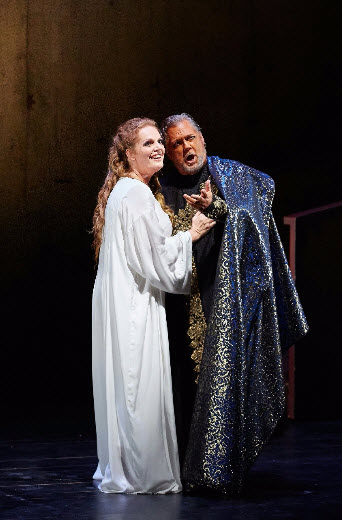 Spain Verdi: Otello, Orchestra and Chorus of Barcelona’s Liceu, Riccardo Frizza (conductor), Peralada Auditorium, 1.8.2015 (JMI)
Spain Verdi: Otello, Orchestra and Chorus of Barcelona’s Liceu, Riccardo Frizza (conductor), Peralada Auditorium, 1.8.2015 (JMI)
Cast:
Otello: Gregory Kunde
Desdemona: Eva Maria Westbroek
Iago: Carlos Álvarez
Cassio: Francisco Vas
Emilia: Mireia Pintó
Ludovico: Miguel Ángel Zapater
Roderigo: Vicenç Esteve Madrid
Montano/Herald: Damián del Castillo
New Production: Festival Castell Peralada in co-production with Macerata Opera Festival
Direction: Paco Azorín
Sets: Paco Azorín
Costumes: Ana Garay
Lighting: Albert Faura
Video Projections: Pedro Chamizo
The Otello at the Festival Castell Peralada featured an excellent cast, one that had raised high hopes among opera lovers. Vocally, the result was mainly in line with expectations; the staging was effective but not on a par with the musical aspect.
This is a new production by Paco Azorín who makes it clear from the beginning that what he wants to perform is not Otello but Iago, who emerges – not without good reason – as the real protagonist. Before the performance even starts, there is a curtain with, in large letters, “Iago by William Shakespeare.” Iago is practically always on stage, playing and singing or just spying on the movements of the other characters. This evil man is always accompanied by a group of people dressed in black, who also move the sets. The stage production is simple but effective with an efficient direction of the actors; the direction of the crowds is weaker, as if the chorus were singing in a concert version.
The sets consist of two large solid blocks, which are moved into different positions, sometimes providing a central staircase. This has the advantage of offering the action on two levels, and solves the problem of the scenes that take place on top of the walls; it’s more effective than when these scenes are done at the back of a stage. The costumes are simple and suitable for the main characters, but rather poor for the choristers.
Marco Armiliato had been announced as conductor, but he cancelled and was replaced by Riccardo Frizza. I don’t know how early the substitution took place, and I therefore don’t know how much time he had for rehearsals. I must also say that an open space like Peralada is not the right place to enjoy a musical performance unless it is extraordinary, which was not the case here. I found Mr. Frizza’s conducting monotonous and routine, especially in the first two acts of the opera. The sound coming out of the pit from the Liceu orchestra was not impressive, and much the same can be said of the Liceu chorus.
American tenor Gregory Kunde was Otello, and he arrived after playing the same character, but in Rossini’s opera, at La Scala. I wonder if there has been any tenor in history that has made both Otellos compatible. Today Kunde, at an advanced age (61) for a tenor, has become one of the most demanded singers in the spinto and even dramatic repertoire. His presence this season in Spain is going to be almost constant. If I am correct he will sing three operas in Bilbao, two in Valencia and one each in Barcelona, Madrid and Seville.
His voice is not what is usually found in the character of Otello, although he offers enough volume and has no problem reaching the audience. His “Essultate” did not offer the power and brilliance traditionally associated with it, but from there on Kunde gave us remarkable singing and intense acting and was totally convincing. He was at his best in “Dio mi potevi scagliar,” and also excellent in the final scene. Kunde as Otello is not significant for his power, but for being one of the few tenors — rather, the only one — who really sings the part, without seeking for decibels.
I found the presence of Eva-Maria Westbroek as Desdemona somewhat surprising. As is well known, this character requires a lyric soprano, while the Dutch soprano has frequented a heavier repertoire in recent years (she was even announced as Santuzza last season). Her stage performance was convincing, and she paid much attention to nuances in her singing. Obviously, in her current vocal state the most challenging part is the “Ave Maria,” and this actually was a problem for her. Nevertheless, she still seems to me a very interesting singer, although I prefer her in a heavier repertoire.
With regard to Carlos Alvarez, I must say, first of all, that he fully shared the view that the director has of Iago in this production. It is excellent news that he is fully recovered from past health problems. For my taste he was the best-suited singer of the trio of protagonists, although I remember him as more nuanced in his interpretations of Iago. I missed in the so-called dream (“Era la notte, Cassio dormia”) a more nuanced singing and a whisper, as in one of his first interpretations of the character 13 years ago in Seville.
Cassio was sung by Francisco Vas, who is always a guarantee of professionalism in any role he sings. His voice is not exactly beautiful, but I always enjoy his performances, and this one was no exception.
As for the secondary roles, I would start by saying that we all know they will never save an opera, but they can make it go broke. Emilia and, in particular, Ludovico were not impressive.
José M. Irurzun
